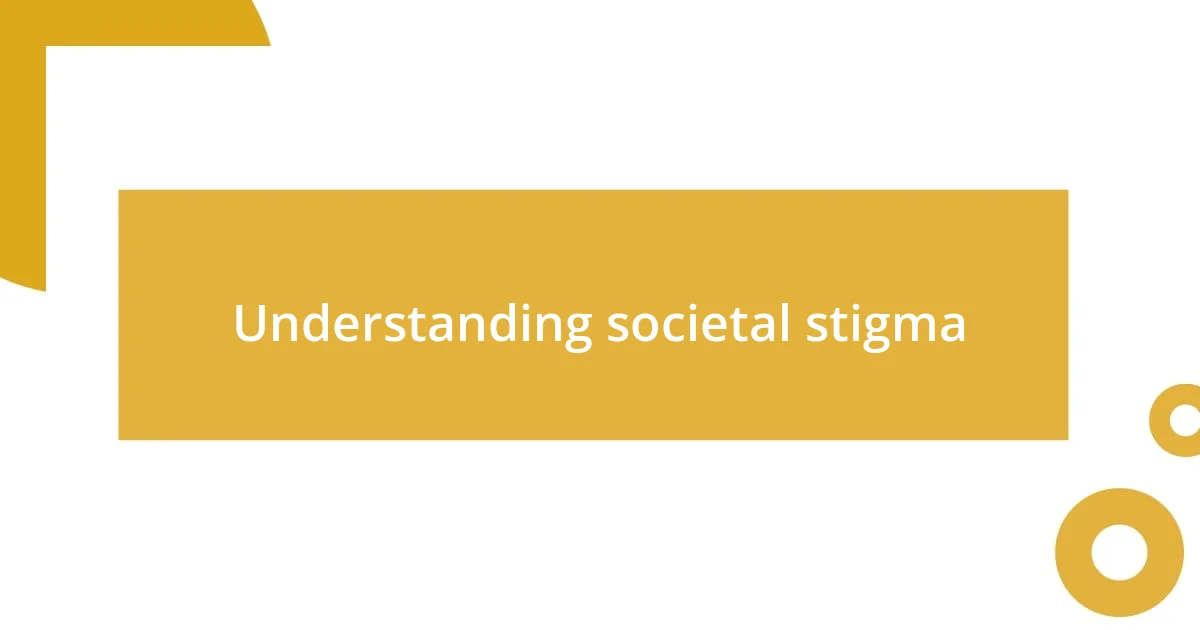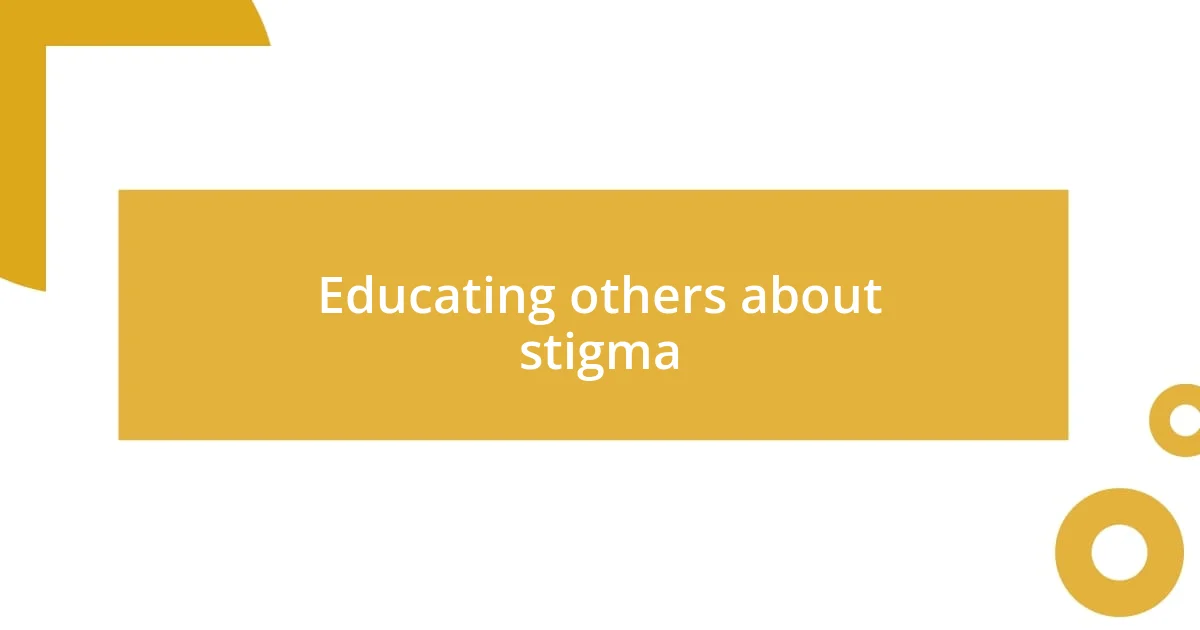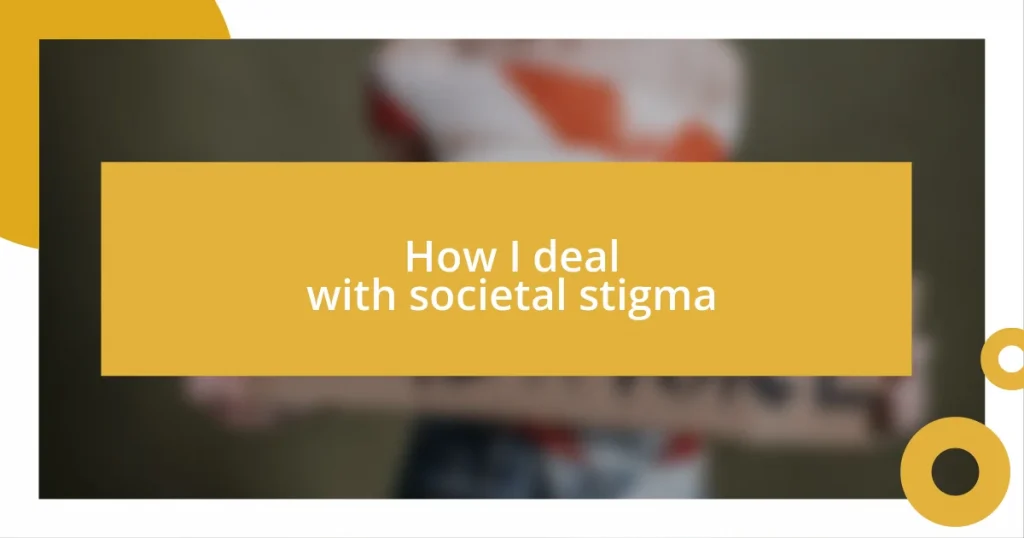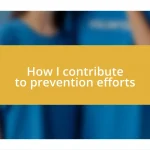Key takeaways:
- Societal stigma often stems from misunderstanding and can deeply affect individuals’ self-identity and mental health.
- Sharing personal experiences and fostering supportive networks are crucial strategies for combating stigma and promoting empathy.
- Education and storytelling play key roles in raising awareness and driving positive societal change regarding stigma.

Understanding societal stigma
Societal stigma is a powerful force that often shapes how individuals perceive themselves and each other. I recall a time when I was hesitant to share my mental health struggles, fearing judgment from friends and family. This fear isn’t just mine; many people grapple with the shame and isolation that stigma can create, leaving them wondering, “What will others think of me?”
It’s fascinating how stigma often stems from misunderstanding or lack of awareness. I remember chatting with a close friend about the stereotypes surrounding those with chronic illness. We both agreed that taking a moment to learn the facts could dispel much of the negativity. Isn’t it curious how a little knowledge can transform fear into empathy?
Through my experiences, I’ve come to realize that societal stigma can be deeply rooted in cultural beliefs and media portrayals. For instance, I once attended a workshop where stories shared by marginalized groups highlighted how negative narratives in films and news reinforced stereotypes. Listening to their journeys made me think, “How do we change the narrative to create a more inclusive society?” It’s a challenge, but one worth pursuing.

Recognizing its impact on individuals
Recognizing the impact of societal stigma can be eye-opening. I remember when a close friend faced backlash for coming out as LGBTQ+. The harsh words thrown at them not only damaged their self-esteem but made it difficult for them to embrace their identity. It’s heartbreaking to see how stigma can lead to internalized shame and even mental health challenges.
Stigma has a ripple effect that reaches beyond the individual. In my own experience, I’ve met individuals with disabilities who shared how societal expectations suffocated their ambitions. They often felt the weight of others’ perceptions bearing down on them, like constantly wearing an invisible backpack filled with societal judgments. The stigma didn’t just create barriers; it often caused them to second-guess their abilities and worth.
It’s crucial to recognize that, for many, stigma is not just an external force; it’s an internal struggle. I’ve often found myself reflecting on how these negative perceptions can affect someone’s day-to-day interactions. There’s a palpable fear in conversation that can overshadow genuine connection. I think we need to ask ourselves: how can we foster understanding and support for those dealing with these challenges?
| Impact of Societal Stigma | Emotional Toll |
|---|---|
| Self-Identity Conflicts | People may struggle to accept themselves due to negative perceptions. |
| Ambition Suppression | Stigma can lead to self-doubt and fear of pursuing goals. |
| Social Isolation | Negative judgments can drive individuals away from community engagement. |

Strategies for coping with stigma
Finding effective strategies to cope with societal stigma can be crucial for our well-being. One approach I’ve found to be beneficial is fostering a supportive network. I recall establishing a small group of friends who openly discussed our experiences with stigma. It was refreshing to share our stories in a safe space, where we could support and uplift each other. Alongside this, practicing self-affirmation—reminding myself of my strengths and worth—has been a powerful tool in combating the negative messages I encountered.
Here are some strategies that have worked for me and might resonate with others:
- Seek out supportive communities: Surround yourself with understanding individuals who share similar experiences.
- Educate others: Use your voice to dispel myths and educate those around you about the realities of stigma.
- Practice self-compassion: Treat yourself with the same kindness you would offer a friend; this helps counteract internalized stigma.
- Engage in advocacy: Advocate for change in your community, whether through volunteer work or sharing your story.
- Develop coping skills: Techniques like mindfulness or journaling can help manage feelings of shame and isolation.
In my journey, I’ve also found that humor can be a surprisingly effective tool against stigma. I remember attending a support group meeting where we shared funny anecdotes about our experiences. Laughter lightened the atmosphere, helping to ease some of the burdens we carried. It reminded me that while stigma is serious, maintaining our sense of humor can empower us to reclaim our narratives.

Building a support network
Building a support network has been a game-changer for me in combatting societal stigma. I vividly remember the first time I attended a local meet-up for individuals facing similar challenges. It was like stepping into a warm embrace, surrounded by people who just “got it.” We shared our stories, and through those conversations, I gained invaluable perspectives that helped me feel less alone.
Over time, I’ve learned that it’s not just about finding people who understand; it’s also about cultivating trust and openness. There was a moment when I opened up about my struggles in a group setting, and to my surprise, others began to share their fears and insecurities too. That vulnerability created such a strong bond among us. It made me realize that a support network thrives on honest exchange, where everyone feels safe to express their vulnerabilities.
When building your own support network, ask yourself: Who in my life can I turn to, and am I ready to be open with them? Sometimes, friends or family may not fully grasp your experiences, so seeking out communities online or locally can provide a much-needed sense of belonging. I’ve found incredible solace in connecting with individuals who share my story—it’s like finding pieces of myself reflected in others. Ultimately, having a supportive circle can help shift the narrative from isolation to empowerment, turning our collective experiences into strength.

Educating others about stigma
Educating others about stigma is incredibly rewarding. I remember one time, I hosted a small gathering at my home where I invited friends to discuss the misconceptions surrounding mental health. It was enlightening to see how many of them genuinely didn’t understand what people with mental health challenges go through. We engaged in an open dialogue, debunking myths and sharing facts. By the end of the night, I could see their perspectives shifting, as understanding bloomed in their eyes. Such moments underline the power of conversation in breaking down barriers.
When I engage in discussions about stigma, I always try to share relatable stories and statistics. For instance, I once shared how societal stigma affected my self-esteem during my teenage years. Then, I supported it with research findings about the detrimental effects of stigma on mental health outcomes. This blend of personal anecdotes with factual data makes the conversation more impactful. I’ve learned that people often connect better with narratives; it makes the issue feel real. Have you ever experienced a similar “aha” moment during discussions where the pieces started to fall into place?
One effective method I use is to create a safe space for dialogue. I remember facilitating a workshop for my community, inviting participants to voice their thoughts and experiences without fear of judgment. I encouraged everyone to listen actively and respond thoughtfully. This respectful exchange is crucial; it fosters an environment where people feel comfortable sharing their own stigmas and misconceptions. I often wonder why we don’t prioritize such spaces more. The transformation I witnessed—where individuals began to empathize with one another—was nothing short of inspiring. It reinforces the notion that with education comes empathy, and with empathy, we can foster a more inclusive society.

Sharing personal experiences
Sharing my personal experiences has always been a vital part of how I confront societal stigma. I remember sitting around a coffee table with a few close friends, nervously sharing the complexities of my journey with anxiety. Their attentive nods and heartfelt responses made me realize that vulnerability truly fosters connection. Have you ever felt a weight lift off your shoulders when you shared something deeply personal?
I also recall when I decided to open up during a community event about my struggles with stigma. As I spoke, I noticed a ripple effect—other attendees started to share their own stories. It struck me how sharing makes the invisible battles visible, transforming isolated feelings into collective strength. It’s amazing how a single moment of honesty can ignite such a powerful exchange among people.
In another instance, I penned an article about my stigma experience to share with a wider audience online. I was nervous, wondering if others would resonate with my words. The feedback surprised me—countless messages flooded in from individuals who felt seen and understood for the first time. It reaffirmed my belief: sharing our stories is like holding a mirror up for others, allowing them to acknowledge their hidden struggles. Isn’t it incredible how our experiences can create spaces for healing and solidarity?

Promoting positive changes in society
Promoting positive changes in society often starts with grassroots efforts that inspire hope and action. I remember volunteering at a local community center, where we organized an event to celebrate the diversity of voices affected by stigma. It was wow-inducing to see families come together, sharing their stories and recognizing shared struggles. Can you imagine what it felt like to watch someone light up as they found their tribe, their experiences validated and appreciated?
I’ve found that storytelling can be an incredibly powerful tool in promoting social change. For instance, during a panel discussion I participated in, I shared how stigma impacted my career journey. As I spoke, I saw nods of understanding from fellow panelists and the audience alike. It reinforced that when we share narratives that resonate, we begin to break down not only stigma but belief systems. Isn’t it fascinating how one story can sometimes spark a chain reaction of change?
Moreover, I advocate for leveraging social media to create waves of awareness. I once initiated a campaign, encouraging individuals to share their “stigma-free” moments online. The resulting stories poured in like a tidal wave, showcasing resilience and fostering connection. It made me wonder: how often do we underestimate the power of a simple post? Through this shared effort, we illuminated the realities of stigma, proving that collective voices are far more potent than individual silence.














